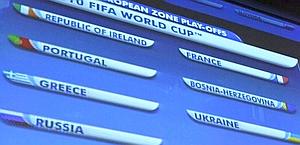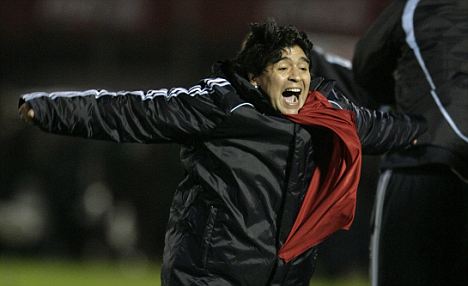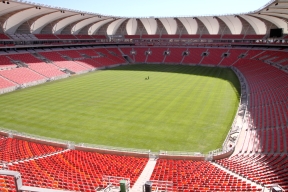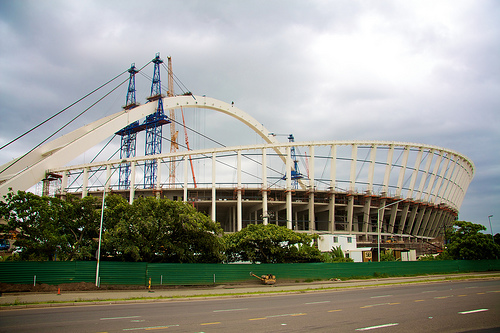People living in poverty near Soccer City stadium outside Johannesburg battle police during anti-World Cup protests. Local residents demand houses rather than world-class stadiums.
Recommended reading: Ashwin Desai’s The Poors and this article.
Tag: 2010 World Cup
European Playoffs: The Draw

Ireland v France: What ever happened to the “luck of the Irish”?
Portugal v Bosnia-Herzegovina: Corporate sponsors breathe huge sigh of relief — Ronaldo is headed to South Africa.
Greece v Ukraine: Mediterraneans in the steppes in mid-November? Ouch.
Russia v Slovenia: Revisiting the Tito-Stalin split.
November 14 and 18.
Maradona is Coming to South Africa

Argentina’s 1-0 win in Montevideo ended the qualification telenovela. El Pibe’s charges earned their ticket to South Africa on the sacred ground of Centenario stadium, where Uruguay defeated Argentina in the inaugural World Cup final in 1930. So Maradona, with all his contradictions and flaws, got the job done. Improvisation can work. In South Africa, Diego hopes to realize his dream of meeting Nelson Mandela.
When I was growing up in Italy as a Juve fan (long story), I had no time for El Pibe. My idol was Michel Platini. After I moved to America, my view of Diego slowly began to change. Not only had he won the ‘86 World Cup almost single-HANDedly, but he then delivered Napoli’s first Italian titles (scudetti) while Platini bowed out of the game.
When I was in college in the late 1980s Italian football was difficult to find on TV. But I was lucky to be a few blocks from a small local station in Hartford (Conn.) that catered to a large Italian-American community. The transmitter had a range of only a few miles, but it got the RAI feed from New York! As a result, I got to delight in Diego’s magical, illuminating inventions, a sometimes perfect synthesis of creativity and pragmatism (i.e., goals, assists, wins). Of course, I was livid when his Argentina beat us in Naples on penalties at Italia ‘90 — the only Italy match I did not attend — but time has healed that painful wound.
Ultimately, as we know, Maradona’s injuries, drug use, and other off-the-field problems undermined his ability to do what he did best — play. His flaws and contradictions, regrettably, sank him lower and lower. Yet I remember that as the tide began to turn against Maradona in Italy (after the 1990 World Cup), he had the audacity and sincerity to go on national TV and say what no Italian dared to say. When the anchor asked him whether he was taking drugs, “Maracoca” shot back: “I am not doing anything captains of industry aren’t doing.” Maybe not the smartest thing to say, but absolutely true.
I have not yet seen Kusturica’s film, but here’s a clip of Maradona that inspired me back in the “good ol’ days”: http://www.youtube.com/watch?v=cJXqFGYenRY
African Media and the World Cup

The 2009 Highway Africa Conference, held recently at Port Elizabeth’s new World Cup stadium (photo above), helped African media be better prepared to cover the 2010 World Cup, according to Guy Berger, head of Rhodes University’s School of Journalism and Media Studies. African media should work to ensure that “coverage is not only focused on the glitz and glamour aspect of the World Cup,” Berger said, “but must be extended to critical evaluation of socioeconomic consequences.”
In a keynote address, Saleem Badat, Rhodes University Vice-Chancellor and licensed football coach, cautioned African journalists against uncritical reporting: “As a supposedly African event, it remains to be seen how, in what ways, and to what extent the media coverage of the 2010 FIFA World Cup will differ from that of previous World Cups.”
Honorable Mention for Cyprus
Three defeats and three points behind third placed Bulgaria, Cyprus are not contenders. Yet, Cypriot footballers are a competitive bunch and cannot be dismissed just yet. What may seem as an exercise in improving their coefficient may suddenly ignite into a qualification campaign.
Cyprus have a game in hand over Ireland. They host Ireland next. The Irish are consistent and concede very little, but the Boys in Green are not so dominant that they can expect to prevail in the battle of divided European islands.
If Cyprus win, there may be more to say about them in September and October.
(This concludes our look at Group 8. Italy remain favorites to qualify. We will have more on Italy closer to the draw in Cape Town. Apparently the Antipodeans are still angry. Whatever. Fabio Grosso is a left back and a gentleman.)
Christopher Merrett

Football is often described as the “beautiful game”. Indeed, it is. As Michael Worsnip pointed out recently (The Witness, June 12), football on the local recreation ground reduces the possibility that young people will be tempted into crime. And, of course, South Africa will host a successful Fifa World Cup next year — if it tries hard enough. All of this is obvious. But what is crucially missing from public debate are a number of awkward political, economic and social questions.
New documentary on 2010 World Cup
Trailer for Fahrenheit 2010 – Warming Up for the World Cup in South Africa on TrailerAddict.
FAHRENHEIT 2010: WARMING UP FOR THE WORLD CUP IN SOUTH AFRICA
directed by Craig Tanner, Australia/South Africa (2009) documentary
The measured Fahrenheit 2010 systematically examines the expectations of a variety of South Africans on the country’s staging of the 2010 FIFA World Cup. Focal points of the film are South Africa’s socio-economic disparities and debate as to whether the erection of state of the art sports arenas will leave the country with white elephants which it can ill afford. Interviewees include Danny Jordaan, Desmond Tutu, Michael Sutcliffe, Jomo Sono, Dennis Brutus and also, amongst others, construction workers, street traders, soccer players and the sangoma with the answer to Bafana Bafana’s woes.